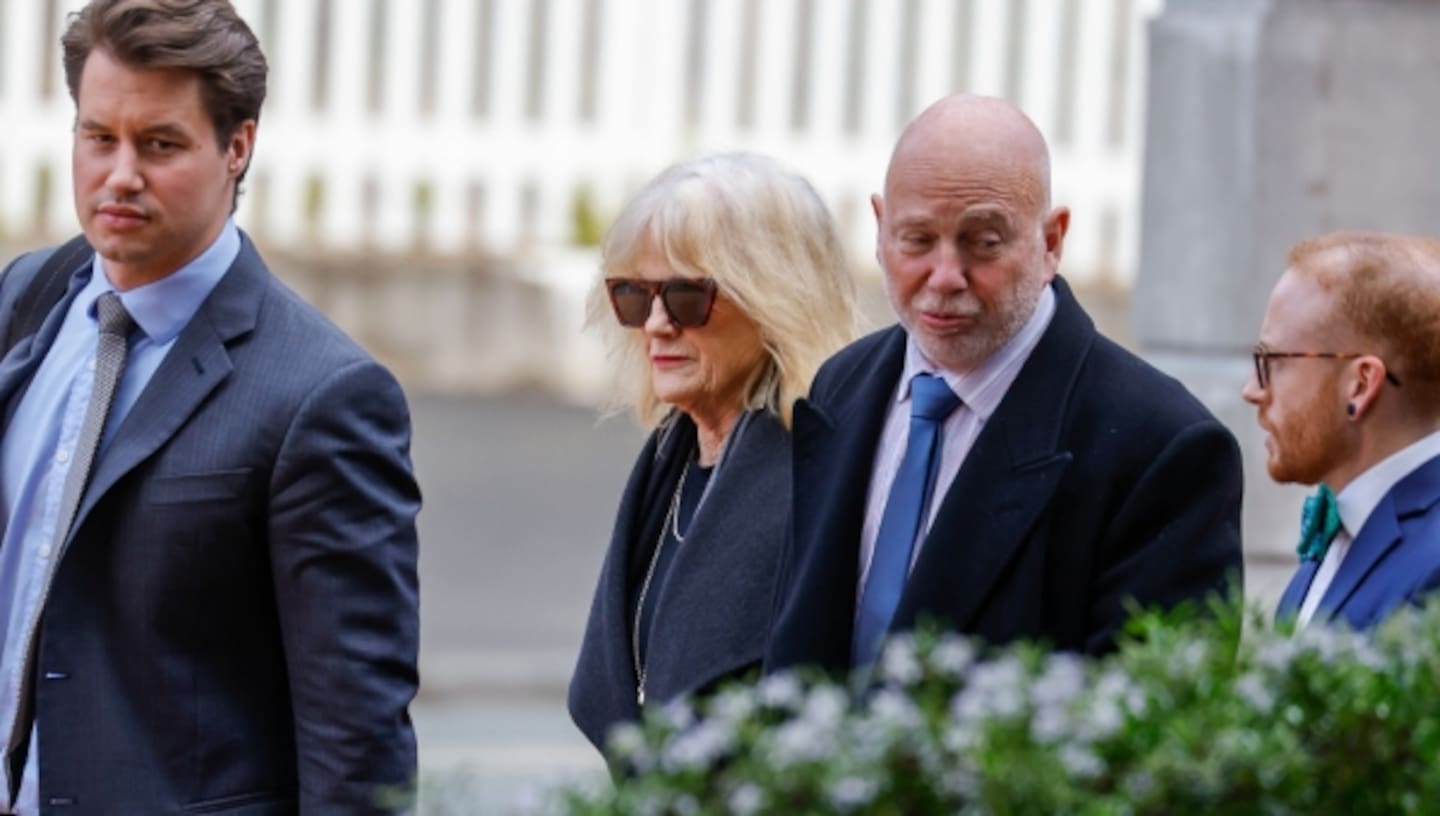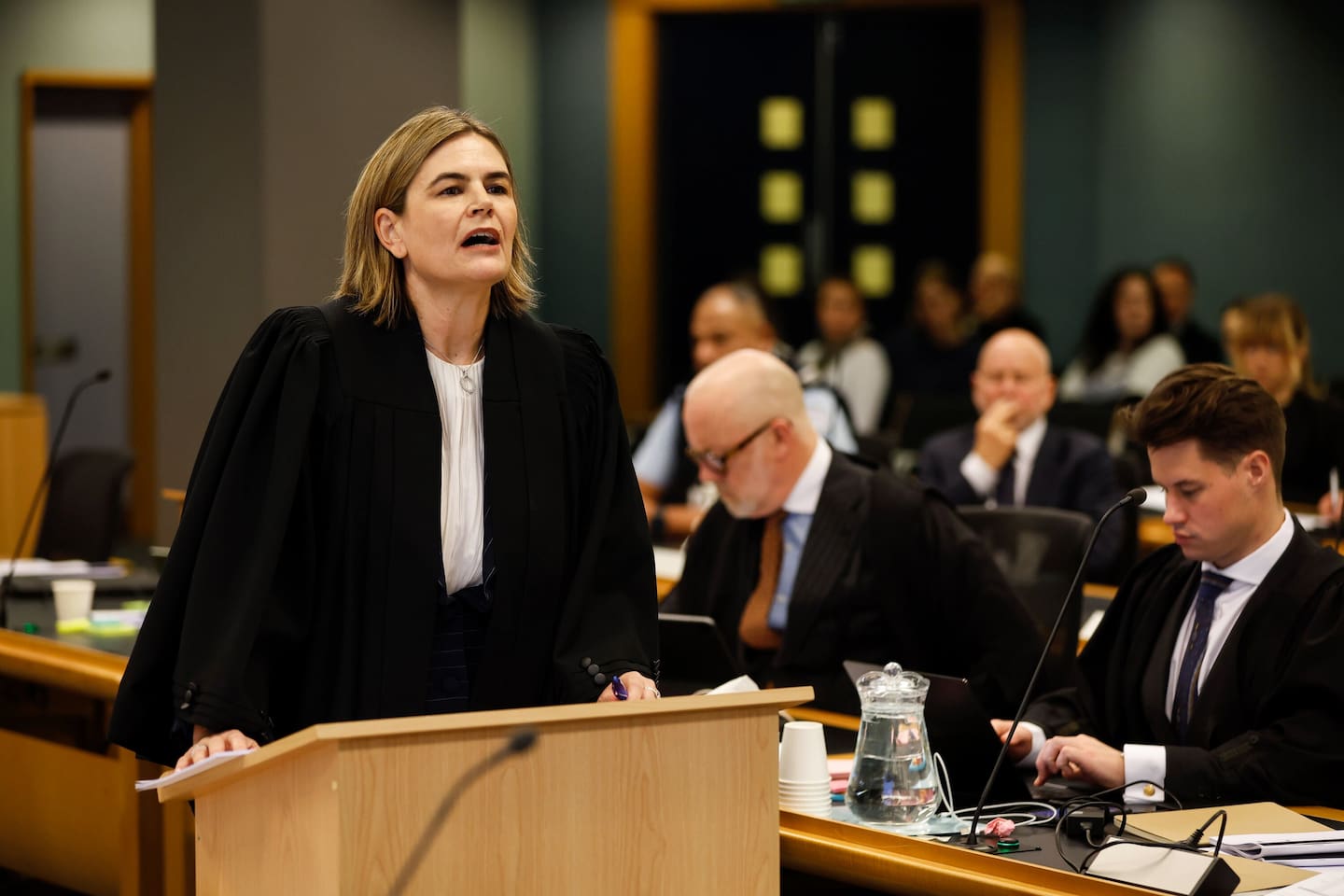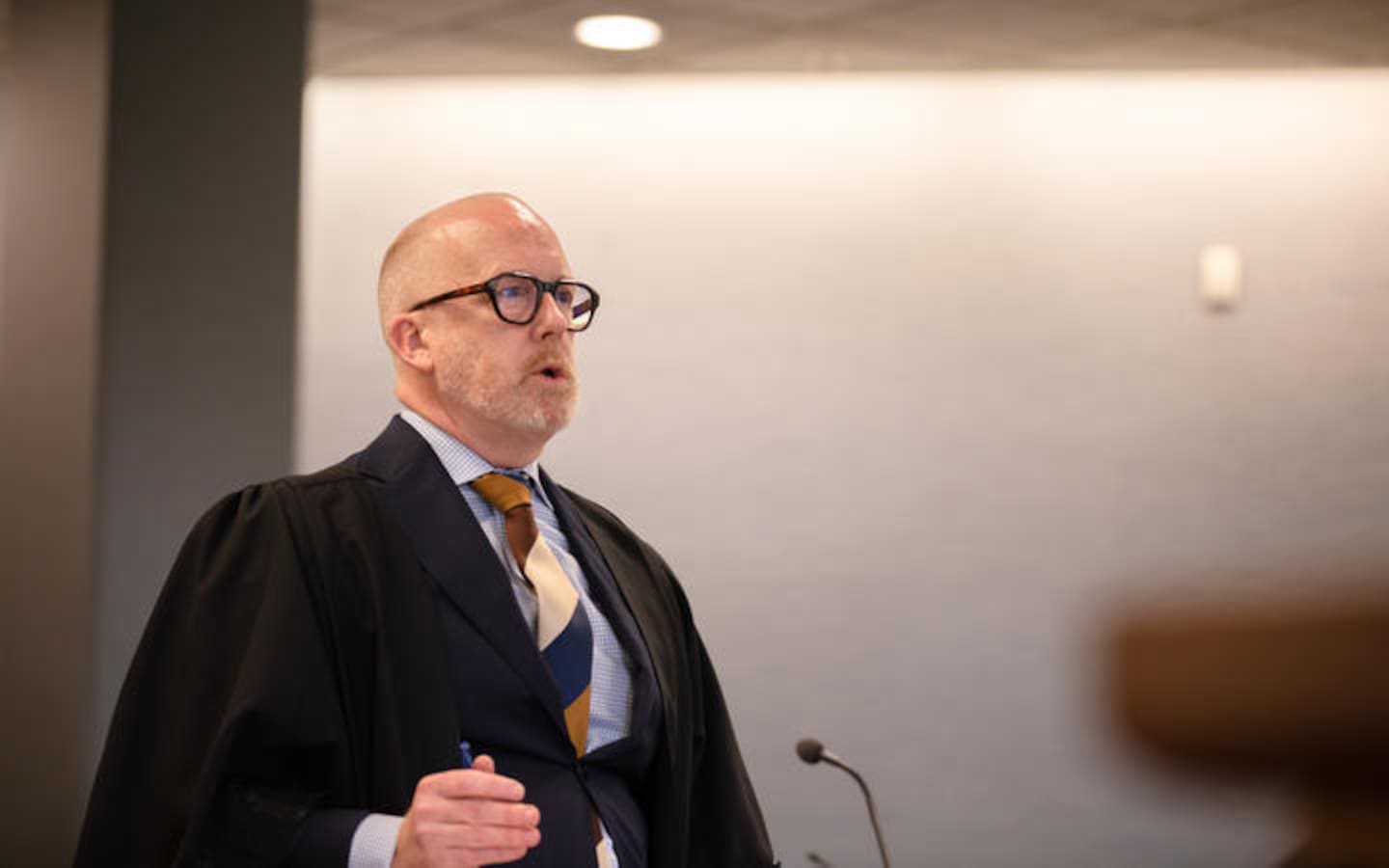WARNING: DISTRESSING CONTENT
The jury in the Philip Polkinghorne murder trial has officially retired to consider their verdict after 52 days of evidence.
The former eye surgeon sobbed in court this morning as the jury was again played the 111 call he made after his wife Pauline Hanna died.
The call was played earlier in the proceeding but the jury requested to hear it this morning before they retired to deliberate their verdict. In the call, Polkinghorne says “she’s blue, she’s cold” and breathes heavily. He made the call from his Remuera home on April 5, 2021. He told emergency services Hanna had hanged herself.
Following the recording being played, Polkinghorne began sobbing into a tissue.
The jury was due to listen to a second recording immediately but were sent back to the jury room at the request of Polkinghorne’s lawyer Ron Mansfield KC so his client could take a break.
 Philip Polkinghorne arrives at the Auckland High Court this morning with his lawyer Harrison Smith, sister Ruth Hughes and son Taine. Photo / Michael Craig
Philip Polkinghorne arrives at the Auckland High Court this morning with his lawyer Harrison Smith, sister Ruth Hughes and son Taine. Photo / Michael Craig
A courthouse security officer who has sat next to Polkinghorne for the duration of the trial led him to a holding area beyond the dock as the jury was led out. Mansfield followed.
Polkinghorne has cried before during the trial, including when an email was read aloud that his wife had written to herself in which she revealed her self-doubts and stress. On the previous occasions, he wept quietly enough that jurors wouldn’t have noticed if they weren’t looking at him. This is the first time he loudly sobbed to the point it interrupted proceedings.
The former eye surgeon arrived at court with his son Taine, sister Ruth Hughes and one of his lawyers, Harrison Smith. There are just over 10 people in the public gallery this morning, far less than the crowd who appeared yesterday.
- Jury "only has two decisions" as Polkinghorne trial nears verdict
- Philip Polkinghorne trial: The jury is going out - what happens now?
- Philip Polkinghorne trial timeline: A look back as jury set to begins deliberations
- Polkinghorne's lawyer warns against 'emotional vigilantism' as summing up begins
- Polkinghorne's lawyer warns against 'emotional vigilantism' in final push of suicide theory; summing up now begins
After a late start to the morning, jury deliberations officially started at about 10.20am. The 111 call was played after they began.
Once Polkinghorne returned to court, the jury of eight women and three men listened to a recording made of Hanna telling relatives of the wild sex life of her husband, herself, and other invited parties.
In November 2019, during an accidentally recorded 24-minute conversation with her brother and niece, Hanna called her husband a “sex fiend” and said he was angry at the world but also said at one point “I’ve considered just chucking myself off a bridge”. The Crown said it was an offhand comment, but Polkinghorne’s lawyer Ron Mansfield said it had to be interpreted in the context of all her other self-harm comments.
She told her family there is control, but she’s “living it through” because at the end of the day she has someone she adores.
He had turned on her recently and told her “all the things” she was. She cried all night and lashed out at colleagues the next day.
”It’s not fair and I’m not going to stuff myself up. I’m not letting him destroy me.
“Please don’t think Phillip’s a beast he’s not ... And I am emotionally bullied but I’m not out of control.”
She asked her family not to hate Polkinghorne because he is a good man who is experiencing stress.
Polkinghorne this morning had his head in his hands and was looking down at the desk as his wife’s voice echoed through the courtroom again. There were no tears this time.
After the recording ended, Justice Graham Lang asked the jury to return to the jury room to deliberate.
Lang told the jury this morning that after he completed his summing up yesterday, counsel asked him to clarify the timing of Hanna’s injuries. In relation to the bruises on the arms, he said defence pathologist Dr Stephen Cordner couldn’t give an exact time she got them but said 24 hours before her death or slightly after.
Regarding the bruise on her temple, he said Cordner and Dr Kilak Kesha agreed it had to be caused while she was alive. Both pathologists also agreed the scrape on her back could have been caused before death or shortly after. Cordner initially believed the injury to Hanna’s nose could have been caused after death but when he was made aware of the possibility of bleeding he said it made it more likely that it happened while she was alive. Kesha did not believe this injury was caused after death.
Lang has indicated a verdict might take days. He has also said he wants the decision to be made without having regard to the pressures of time.
Judge sums up
Yesterday, after 51 days of evidence from more than 80 witnesses, the judge delivered a final summary of the case.
Yesterday’s session began with Mansfield finishing his closing address to jurors before Justice Lang explained to the jury what was required when reaching a verdict and making a final summary of both the Crown and defence cases.
Polkinghorne, 71, has been on trial since July in the High Court at Auckland, accused by prosecutors of having fatally strangled Hanna, 63, inside their Remuera home before staging the scene, to look like a suicide by hanging.
 Pauline Hanna and Philip Polkinghorne at an event in December 2018. Photo / Norrie Montgomery
Pauline Hanna and Philip Polkinghorne at an event in December 2018. Photo / Norrie Montgomery
Justice Lang told jurors they must decide the verdict free of any sympathy or prejudice, which he said could be evoked in “numerous ways” in this case.
“Don’t allow emotion, sympathy or prejudice guide or in any way influence your deliberations,” Justice Lang urged. “Simply focus on the evidence.”
Crown points to threatening behaviour before death
Justice Lang said the Crown had submitted Hanna likely received the finger-mark injuries on one of her arms, the bruise on her skull, an abrasion to her nose and a graze on her back during a struggle.
The Crown also pointed to a small cut on Polkinghorne’s forehead, which he did not have the day before Hanna’s death.
Justice Lang said the Crown also said the jury could look beyond the pathology and at Polkinghorne’s conduct before Hanna died.
As far back as October 2018, the Crown argued, Polkinghorne had expressed an interest in moving to Australia and setting up a life with escort Madison Ashton.
The Crown also submitted there was a degree of threatening or violent behaviour before Hanna’s death, Justice Lang continued.
WATCH A SUMMARY OF THE CROWN AND DEFENCE CASES HERE:
For example, he said they pointed to Hanna’s friends the Riordans claiming she told them Polkinghorne had put his hands around her neck before, and she mimed being strangled.
As well as this the Crown highlighted Polkinghorne’s conduct after Hanna’s death, including deleting his WhatsApp history, searching how to delete iCloud history and searching the term “leg edema following strangulation” on covert search platform DuckDuckGo.
The central theme of the defence case, Justice Lang said, was that the police did not have an open mind from an early stage.
He referenced Mansfield’s submission that the evidence does not support homicidal strangulation and that Hanna tragically took her own life.
 Alysha McClintock, Crown solicitor. Photo / Michael Craig
Alysha McClintock, Crown solicitor. Photo / Michael Craig
Justice Lang recalled Dr Stephen Cordner told the jury that they would normally expect to find significant injuries in the areas where pressure was applied on the neck, which there were not.
Defence argues murder not a ‘realistic prospect’
Mansfield emphasised that the jury can’t read much into Polkinghorne’s dalliances with sex workers, and Hanna had previously participated herself, Justice Lang said.
He told the jury that Mansfield submitted they cannot underestimate the extent other factors were having on Hanna’s mental health at the time of her death.
At times it appeared she was sending emails “all night” then going to work “all day”, Justice Lang says the defence suggested.
Adding to this, Hanna was taking a complicated variety of pharmaceutical drugs, according to the defence. She was on the anti-depressant Prozac, the weight loss pill Duromine, zopiclone for sleep and she was drinking alcohol.
Mansfield argued it was not a “realistic prospect” that Polkinghorne had been able to kill his wife without leaving trace evidence you would expect, like scuff marks or blood on the wall, Justice Lang said.
 Defence lawyer Ron Mansfield. Photo / RNZ
Defence lawyer Ron Mansfield. Photo / RNZ
Mansfield said it was not surprising Polkinghorne deleted his messages as he would not have wanted anyone to see his communications with Madison Ashton and others.
The defence also submitted Polkinghorne had looked up “leg edema following strangulation” as he found Hanna’s legs in a funny position, Justice Lang says.
During the Crown’s day-long closing address earlier this week, Polkinghorne was described as a highly intelligent and arrogant “master manipulator” who also had a concerning methamphetamine habit and a yearning to end his 24-year marriage and start a new life with Ashton. The Crown repeatedly said that suicide “makes no sense” and gave two alternative theories: either Polkinghorne got in an impromptu argument with his wife and lashed out at her or surprised her as she slept in a pre-meditated killing.
In his final response yesterday, Mansfield accused the Crown of being derelict in their duties by not pinning down when, where, why or how Hanna was killed in their theory.
“Let’s keep our options open,” he said with sarcasm. “It’s only a murder trial, after all.”
Mansfield also emphasised Hanna’s multiple suicide risk factors that mental health experts who gave evidence agreed on. He said she was a perfectionist, worried about professional disgrace, she was mourning the recent death of her mother, she reported prior thoughts of self-harm and she had a dangerous combination of alcohol and sleeping pills. He blamed Hanna’s work for not proactively reducing her hours when they saw she was sending work emails at all hours of the night.
He noted that taking a meal to friends and taking items to the tip the day before she died might be seen as signs of suicidal thinking, but more likely killing herself was a spur-of-the-moment decision in the middle of the night.
“There is no more lonely place when you’re already feeling low than the early hours of the morning,” he said. “At that time, when you’re that low, it is the darkest place to be. It is dark, it is bleak, it is desperate and that is where Pauline was likely to be woken to.”
He also went through some of the darkest moments found in her emails. In March 2019: “I cannot live if that is the result that I got it wrong,” she said of the prospect her husband didn’t love her. “I am lost.”
Mansfield said: “That sadly tells us a lot.”
Katie Harris is an Auckland-based journalist who covers issues including sexual assault, workplace misconduct, media, crime and justice. She joined the Herald in 2020.
Craig Kapitan is an Auckland-based journalist covering courts and justice. He joined the Herald in 2021 and has reported on courts since 2002 in three newsrooms in the US and New Zealand.
The Herald will be covering the case in a daily podcast, Accused: The Polkinghorne Trial. You can follow the podcast at iHeartRadio, Apple Podcasts, Spotify, through The Front Page feed, or wherever you get your podcasts.
Take your Radio, Podcasts and Music with you









